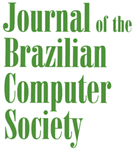LETTER FROM THE GUEST EDITORS
Marta Mattoso; Cláudia Werner
Guest Editors, Special Issue in Databases and Software Engineering - Programa de Engenharia de Sistemas e Computação - COPPE - Universidade Federal do Rio de Janeiro
This special issue presents six papers indicated as best papers of the XVI Brazilian Symposium on Databases and the XV Brazilian Symposium on Software Engineering.
The Database papers address metadata issues in three different scenarios, i.e., querying large scientific databases, describing and organizing documents on the web, and web data integration.
The paper by Lee, Snapp and Musick approach the challenges of querying very large databases generated from scientific experiments. Through the extension and integration of database, statistical, and data mining techniques, the paper addresses issues of designing metadata structures compatible with terabyte-scale data and efficiency in query response time.
Moura, Pereira and Campos present a formal structure for organizing and describing documents on the Web. It is based on a metadata conceptual model that explores relationships between information resources at different levels of granularity. This model is validated through a prototype implemented by adopting both a semi-structured approach, using the RDF model, and a database approach, using the relational-object model.
The third Database, paper by Lóscio, Salgado and Vidal, presents an XML-based mediation system for web data integration. The system uses agents to propagate local schema changes to the mediation level. Maintenance of mediators is based on corresponding assertions for specifying the semantics involved.
The Software Engineering papers regard three different topics: ontologies, multi-agent systems and testing.
The paper by Guizzardi, Falbo and Pereira Filho presents an approach for deriving object frameworks from domain ontologies. The formalization of ontology elements (concepts and relations) uses a set-based language called Lingo. These elements are mapped to object-oriented elements (classes and associations), having each precondition of a relation between concepts guaranteed by consolidation patterns. The approach is applied to the software process domain.
Garcia, Silva, Chavez, Lucena and Milidiu propose a new approach for building multi-agent object-oriented software from early stage of design. It uses aspect-based design and programming for integrating software agents into the object model. The approach is demonstrated through a web-based environment for the development of e-commerce portals. The authors compare their approach with a pattern-based approach for multi-agent object-oriented systems.
Finally, the paper by Simão and Maldonado describes a language, called Mudel, for the description of mutant operators in the context of a mutation testing approach. The language involves concepts from the transformational and logical programming paradigms. It deals with context free mutations. A mutant generator and animator to compile and debug operator descriptions are also presented.
Concluding, on behalf of the Brazilian Computer Society, we would like to thank the authors for their contributions to this special issue on Databases and Software Engineering of the Journal of the Brazilian Computer Society.
Publication Dates
-
Publication in this collection
12 Jan 2004 -
Date of issue
July 2002

